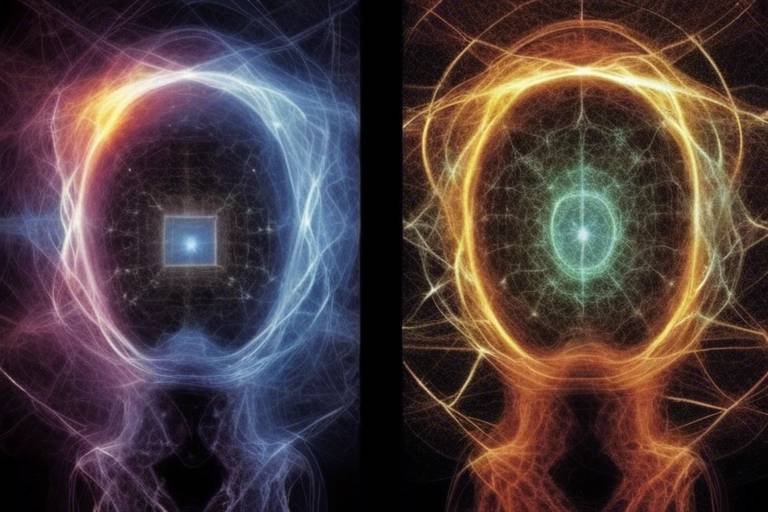What do We Mean by Metaphysical Truth?
When we talk about metaphysical truth, we’re diving into the deep end of philosophy. It’s not just about what we can see, touch, or measure; rather, it’s about the underlying principles that govern our existence. Think of it as the foundation of a house. The house might look beautiful on the outside, but without a solid foundation, it won't stand for long. Similarly, metaphysical truths provide the essential framework for understanding the universe and our place within it.
At its core, metaphysical truth seeks to answer some of the most profound questions: What is reality? What does it mean to exist? Are there truths that transcend our physical world? These questions may seem abstract, but they are crucial for anyone who wishes to grasp the essence of life itself. Just as a detective pieces together clues to solve a mystery, philosophers have been piecing together ideas and arguments to uncover the mysteries of existence.
To illustrate, consider how different philosophies approach metaphysical truth. For instance, Plato posited that the physical world is merely a shadow of a higher reality, the realm of ideal forms. In contrast, modern thinkers might argue that our understanding of truth is shaped by our experiences and perceptions. This divergence in thought illustrates that metaphysical truth is not a monolithic concept but rather a rich tapestry woven from various philosophical threads.
Moreover, metaphysical truth doesn't exist in a vacuum. It influences our ethical beliefs, our understanding of reality, and even our relationships with others. Imagine trying to navigate a city without a map; without a grasp of metaphysical truth, we may find ourselves lost in a world full of conflicting ideas. Thus, grappling with metaphysical truth is not just an academic exercise; it’s a vital part of human existence.
In summary, metaphysical truth is a complex and multifaceted concept that challenges us to look beyond the surface of reality. It invites us to explore the deeper meanings of our existence and the universe. As we embark on this philosophical journey, we must remain open to the myriad interpretations and insights that have emerged throughout history, shaping our understanding of what it truly means to exist.

The Nature of Metaphysical Truth
Metaphysical truth is like the hidden treasure of philosophical inquiry, diving deep into the essence of reality that often escapes our immediate grasp. It compels us to ask profound questions: What is the nature of existence? Is there a reality that lies beyond what we can touch, see, or hear? In essence, metaphysical truth challenges us to look beyond the physical realm and explore the very fabric of our being. It’s akin to peeling an onion; each layer reveals not just more complexity but also deeper insights into our understanding of reality itself.
When we talk about metaphysical truth, we’re venturing into the realm of abstract concepts that defy empirical measurement. Unlike empirical truths, which are grounded in observable phenomena and can be tested through scientific methods, metaphysical truths often reside in the realm of ideas and beliefs. These truths are not easily quantifiable; they require a different kind of exploration. Imagine trying to measure love or happiness—these are feelings that, while profoundly real, cannot be quantified in the same way we measure physical objects. This is the challenge and beauty of metaphysical truth.
To better understand metaphysical truth, we can categorize it into several key aspects:
- Existence: What does it mean to exist? This question leads us down a rabbit hole of philosophical thought, from Descartes' famous declaration "I think, therefore I am" to existential musings about the nature of being.
- Reality: Is there a single reality, or are there multiple realities shaped by individual perceptions? This leads to discussions about subjective versus objective reality.
- Nature of Knowledge: How do we know what we know? This aspect delves into epistemology, questioning the sources and limits of our knowledge.
Philosophers have long debated these aspects, each contributing their unique perspectives to the conversation. For instance, Plato posited the existence of ideal forms—abstract representations of concepts that exist beyond our physical world. In contrast, Kant introduced the idea of transcendental idealism, suggesting that our understanding of reality is shaped by the inherent structures of our mind. These philosophical frameworks illustrate how metaphysical truth is not just a static concept but a dynamic interplay of ideas that evolve over time.
Moreover, the nature of metaphysical truth invites us to explore the relationship between language and thought. Our ability to articulate these abstract concepts often shapes our understanding of them. Language is not merely a tool for communication; it’s a lens through which we interpret reality. Think about it: the words we choose can either illuminate or obscure our understanding of metaphysical truths. This connection between language and metaphysics highlights the complexity of articulating ideas that are often beyond our tangible experiences.
Ultimately, grappling with the nature of metaphysical truth is an invitation to expand our horizons. It encourages us to question, to ponder, and to explore the depths of our existence. As we navigate through life, these inquiries can profoundly shape our perceptions, beliefs, and interactions with the world around us. So, the next time you find yourself pondering the meaning of life or the nature of reality, remember that you’re engaging with the very essence of metaphysical truth.
- What is metaphysical truth? Metaphysical truth refers to the understanding of reality that goes beyond the physical realm, exploring concepts like existence, reality, and knowledge.
- How does metaphysical truth differ from empirical truth? Empirical truth is based on observable phenomena and can be tested scientifically, while metaphysical truth deals with abstract ideas that are often subjective.
- Why is metaphysical truth important? Understanding metaphysical truth can influence our beliefs, ethics, and how we interact with the world, shaping our personal and collective identities.

Historical Perspectives on Metaphysical Truth
Throughout the ages, the quest for metaphysical truth has captivated the minds of some of the most brilliant philosophers. From ancient times to the modern era, thinkers have grappled with the nature of reality, existence, and what it means to understand the world beyond mere appearances. One of the earliest contributors to this discourse was Plato, who introduced the idea of ideal forms. According to Plato, the physical world is merely a shadow of a higher reality, where these perfect forms exist. For him, metaphysical truth was about grasping these eternal truths, which could only be accessed through intellectual reasoning rather than sensory experience.
Fast forward to the Enlightenment, and we encounter Immanuel Kant, who revolutionized our understanding of metaphysical truth with his concept of transcendental idealism. Kant argued that our perception of reality is shaped by the structures of our mind. He proposed that while we can never know things as they are in themselves, we can understand them through the categories of our experience. This perspective opened up a new avenue for exploring metaphysical truths, suggesting that our understanding is always filtered through human cognition.
As we delve deeper into the historical landscape, we find G.W.F. Hegel, who took a dialectical approach to metaphysical truth. Hegel believed that reality is a dynamic process, constantly evolving through a series of contradictions and resolutions. His view suggests that metaphysical truth is not static but rather a journey of becoming, where the unfolding of ideas leads to greater understanding. This perspective laid the groundwork for later existential and phenomenological thinkers, who would further explore the implications of human experience in relation to metaphysical truth.
In the 20th century, the landscape of philosophy shifted with the rise of existentialism and postmodernism. Thinkers like Jean-Paul Sartre and Michel Foucault challenged traditional notions of metaphysical truth, arguing that truth is subjective and constructed through social and historical contexts. This marked a significant departure from earlier philosophical paradigms, emphasizing the role of language and power in shaping our understanding of reality. As such, the question of metaphysical truth became not just an inquiry into existence but also a critique of the frameworks through which we interpret our experiences.
To summarize the evolution of metaphysical truth, we can look at the following table that highlights key philosophers and their contributions:
| Philosopher | Key Concept | Period |
|---|---|---|
| Plato | Ideal Forms | c. 427–347 BC |
| Immanuel Kant | Transcendental Idealism | 1724–1804 |
| G.W.F. Hegel | Dialectical Process | 1770–1831 |
| Jean-Paul Sartre | Existentialism | 1905–1980 |
| Michel Foucault | Power and Knowledge | 1926–1984 |
In conclusion, the historical perspectives on metaphysical truth reveal a rich tapestry of thought that has evolved over centuries. Each philosopher has contributed unique insights, challenging and reshaping our understanding of reality. As we continue to explore these ideas, we find ourselves not just pondering the nature of truth, but also questioning how these truths impact our lives and the world we inhabit.

Metaphysical Truth vs. Empirical Truth
When we dive into the realms of metaphysical truth and empirical truth, we’re essentially embarking on a journey that asks us to reconsider how we define and perceive reality. While empirical truth is grounded in what we can observe and measure—think of it as the tangible world that we can touch, taste, and see—metaphysical truth takes us into the abstract, the philosophical, and the often unquantifiable aspects of existence. It’s like comparing apples to oranges; both are fruits, but they exist in different dimensions of our understanding.
To put it simply, empirical truth is all about evidence. It relies on data, experiments, and observations. For instance, if you drop a ball, you can observe it falling due to gravity. This is empirical truth at work. It’s the foundation of the scientific method, where hypotheses are tested and validated. But what about questions that go beyond the physical? What about the essence of being, the nature of consciousness, or the concept of morality? These questions lead us into the territory of metaphysical truth.
Metaphysical truth, on the other hand, deals with the fundamental nature of reality itself. It asks questions like: What is existence? What does it mean to be? Is there a higher power or ultimate reality? These inquiries often cannot be answered through mere observation or experimentation. Instead, they require deep philosophical exploration and subjective interpretation. To illustrate this, consider the following table that contrasts the two types of truth:
| Aspect | Metaphysical Truth | Empirical Truth |
|---|---|---|
| Definition | Truth beyond the physical realm | Truth based on observable phenomena |
| Nature | Abstract and philosophical | Tangible and measurable |
| Examples | Existence of the soul, nature of time | Gravity, chemical reactions |
| Method of Inquiry | Philosophical reasoning | Scientific experimentation |
The distinction between these two types of truth is not merely academic; it has real-world implications. For example, in ethics, the question of whether moral truths are absolute (metaphysical) or relative and dependent on societal norms (empirical) shapes how we approach moral dilemmas. Imagine a world where every decision is made based solely on empirical data—how would that affect our understanding of compassion, empathy, and human connection?
In conclusion, while empirical truth gives us the tools to navigate the physical world, metaphysical truth invites us to explore the deeper meanings that underpin our existence. Both play vital roles in shaping our understanding of reality, but they operate in distinct realms that often intersect in fascinating ways. As we continue to explore these ideas, we find that the conversation between metaphysical and empirical truth is not just an academic exercise; it's a journey into the very heart of what it means to be human.
- What is the main difference between metaphysical truth and empirical truth?
Metaphysical truth deals with abstract concepts and the essence of existence, while empirical truth is based on observable and measurable phenomena.
- Can metaphysical truths be proven?
Metaphysical truths often cannot be proven in the same way empirical truths can; they rely more on philosophical reasoning and subjective interpretation.
- Why is understanding both types of truth important?
Understanding both helps us navigate complex questions about existence, ethics, and reality, enriching our overall comprehension of the world.

The Role of Language in Metaphysical Truth
Language is more than just a tool for communication; it is the very fabric that weaves together our understanding of reality, especially when it comes to metaphysical truth. Think about it: how can we express the inexpressible? How do we articulate concepts that lie beyond the physical realm? This is where language steps in, acting as a bridge between our thoughts and the abstract ideas we grapple with. Through language, we can explore the depths of our consciousness and the universe, but it also presents challenges. After all, words can be slippery and subjective, often failing to capture the true essence of what we mean.
The significance of language in metaphysical discussions cannot be overstated. Philosophers like Ludwig Wittgenstein have argued that the limits of our language are the limits of our world. This means that if we cannot articulate a metaphysical truth, it might as well not exist for us. In this sense, language shapes our understanding of existence itself. For instance, when we talk about concepts like being, non-being, or even nothingness, we are using language to frame ideas that are inherently complex and often paradoxical.
Moreover, the evolution of language has paralleled our philosophical inquiries. As new words and phrases emerge, they open doors to new ways of thinking about metaphysical truths. Consider the rise of terms like quantum entanglement or multiverse. These concepts challenge traditional notions of reality and existence, prompting us to rethink our understanding of the universe. Language, thus, is not static; it evolves as our comprehension of metaphysical truths deepens.
However, the relationship between language and metaphysical truth is not without its pitfalls. Misinterpretations can arise, leading to confusion and debate. For instance, when discussing the idea of free will, different philosophical traditions use varying terminologies that can lead to vastly different interpretations. In some cultures, the term may imply absolute freedom, while in others, it might suggest a more deterministic view. This semantic ambiguity can complicate the discourse surrounding metaphysical truths.
In addition, the role of metaphor in language cannot be overlooked. Metaphors allow us to convey abstract ideas by relating them to more concrete experiences. For example, when we say, "Time is a river," we are using a metaphor to help us grasp the fluid, ever-changing nature of time. This technique is particularly useful in metaphysical discussions, where direct explanations often fall short. By employing metaphors, we can evoke feelings and images that resonate with deeper truths, making the abstract more accessible.
Ultimately, the interplay between language and metaphysical truth is a fascinating dance. It invites us to question not only what we say but also how we say it. Are we limiting our understanding by the words we choose? Or are we expanding our horizons through the creative use of language? As we navigate the complexities of existence, it becomes increasingly clear that the words we use shape our perceptions and beliefs about reality. Thus, the study of metaphysical truth is, in many ways, a study of language itself.
- What is metaphysical truth? Metaphysical truth refers to the fundamental nature of reality that goes beyond the physical world, exploring concepts like existence, being, and the nature of the universe.
- How does language influence our understanding of metaphysical truths? Language shapes our perceptions and articulations of metaphysical concepts, often acting as a bridge between abstract ideas and human understanding.
- Can metaphysical truths be proven? Unlike empirical truths, metaphysical truths often deal with abstract concepts that are not easily verifiable, leading to ongoing debates in philosophy.
- Why are metaphors important in discussing metaphysical truths? Metaphors help convey complex and abstract ideas by relating them to more familiar experiences, making them more accessible and relatable.

Metaphysical Truth in Eastern Philosophy
When we dive into the realm of Eastern philosophy, we find a rich tapestry of ideas that challenge our conventional understanding of metaphysical truth. Unlike the often rigid frameworks of Western thought, Eastern philosophies such as Buddhism and Taoism present a more fluid approach to existence and reality. These traditions emphasize the transient nature of life and the interconnectedness of all beings, fundamentally altering how we perceive truth itself.
In Buddhism, for instance, the concept of impermanence (Anicca) is central. It teaches that all things are in a constant state of flux, which leads to the understanding that clinging to fixed notions of truth can cause suffering. This idea invites us to reconsider the very nature of truth: if everything is impermanent, can there be a single, unchanging truth? Instead, Buddhists propose a more dynamic view of reality, where truth is contextual and often subjective, shaped by personal experiences and perceptions.
Similarly, Taoism offers profound insights into metaphysical truth through its concept of the Tao, or the Way. The Tao is seen as the fundamental principle that underlies and unites all existence. It is not a fixed entity but rather an ever-flowing force that shapes the universe. This perspective encourages individuals to align themselves with the natural flow of life, suggesting that truth is not something to be grasped but experienced. The Tao Te Ching, a foundational text of Taoism, eloquently illustrates this idea, stating that "the Tao that can be told is not the eternal Tao." This highlights the limitations of language and concepts in expressing metaphysical truths.
Moreover, Eastern philosophies often explore the idea of non-duality, which posits that the separation between self and other is an illusion. This perspective is particularly prevalent in Advaita Vedanta, a school of Hindu philosophy that teaches that the individual self (Atman) is ultimately one with the universal consciousness (Brahman). This realization leads to a profound understanding of truth as an intrinsic part of existence, rather than an external concept to be discovered or defined. It challenges the binary thinking that often dominates Western philosophical discourse, urging us to embrace a more holistic view of reality.
In summary, the exploration of metaphysical truth in Eastern philosophy invites us to question our assumptions and embrace a more nuanced understanding of existence. By recognizing the interconnectedness of all beings and the impermanent nature of reality, we open ourselves to a truth that is not static but ever-evolving. This perspective not only enriches our philosophical inquiries but also offers practical insights for navigating the complexities of life.
- What is the main difference between Eastern and Western views on metaphysical truth?
Eastern philosophies often emphasize the fluidity of truth and interconnectedness, while Western philosophies tend to focus on fixed, objective truths.
- How does Buddhism approach the concept of truth?
Buddhism teaches that truth is subjective and shaped by personal experiences, emphasizing impermanence and the avoidance of clinging to fixed notions.
- What role does language play in expressing metaphysical truths in Eastern philosophy?
Language is seen as limited in expressing the complexities of metaphysical truths, as many concepts are ultimately beyond verbal articulation.

Contemporary Views on Metaphysical Truth
In the ever-evolving landscape of philosophy, the concept of metaphysical truth has sparked vibrant debates among contemporary thinkers. As we dive into this intricate web of ideas, it's essential to recognize that modern philosophers approach metaphysical truth from a variety of angles, often influenced by advancements in science, technology, and cultural shifts. This exploration is not merely academic; it shapes our understanding of existence and reality in profound ways.
At the heart of these discussions lies a fundamental question: What is the nature of reality? While some philosophers advocate for a more traditional view—rooted in the belief that there are objective truths waiting to be discovered—others argue that our understanding of truth is inherently subjective. This divergence raises intriguing questions about the implications of metaphysical truth in our daily lives. For instance, how do our personal experiences and cultural backgrounds influence our perception of what is real? Are we merely observers in a universe governed by fixed truths, or are we active participants in constructing our own realities?
One prominent figure in contemporary philosophy is Daniel Dennett, who challenges the notion of absolute metaphysical truths. He posits that our understanding of consciousness and reality is shaped by evolutionary processes and cultural narratives. Dennett's perspective encourages us to consider how our beliefs about truth are influenced by our biological makeup and societal contexts, rather than being purely objective. This idea resonates with many, as it highlights the fluidity of truth in a world that is constantly changing.
Moreover, the rise of postmodern thought has further complicated the discourse around metaphysical truth. Postmodernists argue that the very concept of an absolute truth is an illusion, suggesting that truths are constructed through language and social interactions. This perspective invites a more pluralistic approach to understanding reality, where multiple truths coexist and are validated through different lenses. It challenges us to embrace uncertainty and ambiguity, pushing the boundaries of traditional philosophical thought.
In addition to these philosophical debates, contemporary discussions also intersect with various fields such as science and ethics. For instance, the implications of quantum mechanics have led some philosophers to reconsider the nature of reality itself, suggesting that at a fundamental level, reality may be more interconnected and less deterministic than previously thought. This scientific perspective invites us to rethink our metaphysical assumptions and consider how they align with empirical findings.
Furthermore, the exploration of metaphysical truth has significant ethical implications. If we accept that our understanding of truth is shaped by subjective experiences, we must grapple with the moral responsibility that comes with this realization. How do we navigate ethical dilemmas in a world where truths can vary widely between cultures and individuals? This question underscores the importance of dialogue and understanding in a globalized society, where differing perspectives on truth can lead to both conflict and collaboration.
As we reflect on these contemporary views, it's evident that the discourse surrounding metaphysical truth is far from settled. It remains a dynamic field, inviting ongoing exploration and debate. To summarize the key points discussed:
| Key Contemporary Perspectives | Philosopher/Thinker | Core Idea |
|---|---|---|
| Subjectivity of Truth | Daniel Dennett | Truth is shaped by evolution and culture. |
| Postmodern Thought | Various | Truth is constructed through language and social contexts. |
| Scientific Influence | Quantum Mechanics Theorists | Reality may be interconnected and less deterministic. |
| Ethical Implications | Contemporary Ethicists | Subjective truths challenge moral responsibility. |
In conclusion, contemporary views on metaphysical truth reveal a rich tapestry of thought that challenges us to reconsider our assumptions about reality. By engaging with these diverse perspectives, we can expand our understanding of existence and navigate the complexities of our world with greater awareness.
- What is metaphysical truth? Metaphysical truth refers to the nature of reality beyond the physical realm, exploring what is ultimately true through various philosophical lenses.
- How does contemporary philosophy view metaphysical truth? Contemporary philosophy presents diverse views, ranging from subjective interpretations influenced by culture to objective truths rooted in scientific inquiry.
- Why is understanding metaphysical truth important? Understanding metaphysical truth has profound implications for ethics, personal identity, and how we interact with the world.
- How does science influence metaphysical discussions? Advancements in science, particularly in fields like quantum mechanics, challenge traditional notions of reality and encourage a reevaluation of metaphysical assumptions.

Critiques of Metaphysical Truth
Critiques of metaphysical truth often stem from a fundamental skepticism regarding the nature of reality itself. Many philosophers argue that metaphysical claims are, at best, subjective interpretations of existence that lack empirical verification. This skepticism raises important questions: Can we truly know anything beyond the tangible world? Are our perceptions merely constructs of the mind, shaped by language and culture? These inquiries challenge the validity of metaphysical truths and suggest that they may be more about personal belief than objective reality.
One of the primary critiques is rooted in the idea that metaphysical truths are inherently unverifiable. Unlike empirical truths, which can be tested and observed through scientific methods, metaphysical claims often reside in the realm of the abstract. For instance, consider the notion of an absolute truth or a universal moral law. How can we prove such concepts exist? Critics argue that without empirical evidence, metaphysical truths remain speculative at best. This skepticism is echoed in the works of philosophers like David Hume, who emphasized the limitations of human understanding and the role of experience in shaping our beliefs.
Furthermore, the rise of postmodern thought has intensified these critiques. Postmodernists argue that the very idea of a singular, objective truth is a construct of Western philosophy, one that overlooks the diversity of human experience. They posit that what we often consider metaphysical truths are merely narratives shaped by cultural contexts. This perspective encourages a more pluralistic approach to understanding reality, suggesting that multiple truths can coexist, each valid within its own framework. This viewpoint opens the door to a more inclusive understanding of existence, but it also raises the question: if all truths are subjective, does metaphysical truth hold any real significance?
The implications of these critiques extend beyond philosophy into ethics and politics. If metaphysical truths are subjective, then moral frameworks based on these truths may also be questioned. For instance, how do we ground our ethical decisions if there is no absolute truth? This dilemma forces us to reconsider the foundations of our beliefs and the societal structures built upon them. It also invites us to explore alternative ways of understanding morality, perhaps through a more relativistic lens.
In summary, while metaphysical truths have historically provided a framework for exploring existence and reality, they are not without their challenges. Critics highlight the subjective nature of these truths and question their relevance in a world increasingly dominated by empirical evidence and skepticism. As we navigate these philosophical waters, it becomes essential to engage with these critiques thoughtfully, recognizing that our understanding of truth—whether metaphysical or empirical—continues to evolve.
- What is metaphysical truth?
Metaphysical truth refers to the concepts and beliefs about the nature of reality that go beyond the physical and observable world. - Why do some philosophers criticize metaphysical truth?
Critics argue that metaphysical truths are often unverifiable and subjective, lacking the empirical evidence that supports scientific claims. - How do critiques of metaphysical truth affect ethical discussions?
If metaphysical truths are subjective, it challenges the foundations of moral frameworks, leading to a more relativistic approach to ethics.

Implications of Metaphysical Truth
Understanding metaphysical truth is not just an abstract exercise confined to the dusty halls of philosophy; it has real-world implications that ripple through our lives, shaping our ethics, politics, and even our personal identities. Imagine metaphysical truth as a lens through which we view the world; it colors our perceptions, influences our decisions, and ultimately defines how we relate to one another and the universe at large. For instance, if we believe in a metaphysical truth that emphasizes the interconnectedness of all beings, as seen in many Eastern philosophies, we might approach environmental issues with a sense of responsibility and care for the planet. This understanding can provoke a shift in our values, leading to more sustainable practices.
Moreover, metaphysical truth challenges us to question the very foundations of our beliefs. In a society that often prioritizes empirical evidence, grappling with metaphysical concepts can feel daunting. Yet, this struggle is essential. It encourages us to explore questions like: What is the nature of existence? Are our identities fixed, or are they fluid and ever-changing? Such inquiries can lead to profound personal transformations, as we reassess our values and the way we interact with others. The implications extend to social structures and governance as well, as metaphysical beliefs can influence political ideologies and policies.
In terms of ethics, metaphysical truths can guide our moral compass. For example, if one subscribes to a metaphysical view that emphasizes universal truths or moral absolutes, it could lead to a more rigid moral framework. Conversely, a belief in subjective truths may foster a more flexible and tolerant approach to ethical dilemmas. It’s fascinating to consider how these differing perspectives can lead to vastly different societal norms and legal systems. Below is a table that outlines some of these implications:
| Aspect | Metaphysical Truth Perspective | Implications |
|---|---|---|
| Ethics | Universal truths | Rigid moral frameworks |
| Ethics | Subjective truths | Flexible, tolerant approaches |
| Politics | Collectivism | Policies that prioritize community welfare |
| Politics | Individualism | Emphasis on personal freedoms and rights |
| Identity | Fixed identity | Stable self-concept |
| Identity | Fluid identity | Dynamic self-concept |
In conclusion, the implications of metaphysical truth are vast and multifaceted. They shape not just individual beliefs but also collective societal norms. As we navigate through life, recognizing and understanding these implications can empower us to make more informed choices, fostering a deeper connection with ourselves and the world around us. So, the next time you ponder the nature of reality, consider how your beliefs may be influencing your actions and interactions. It’s a profound realization that can lead to a more meaningful existence.
- What is metaphysical truth? Metaphysical truth refers to the essence of reality beyond the physical realm, exploring what is ultimately true.
- How does metaphysical truth influence ethics? It shapes our moral frameworks, determining whether we view ethics as absolute or subjective.
- Can metaphysical truth affect politics? Yes, different metaphysical beliefs can lead to varying political ideologies and policies.
- What role does metaphysical truth play in personal identity? It influences how we perceive ourselves, whether as fixed beings or as dynamic, ever-changing entities.
Frequently Asked Questions
- What is metaphysical truth?
Metaphysical truth refers to the underlying realities that exist beyond the physical world. It seeks to answer profound questions about existence, reality, and the essence of being, often exploring concepts that cannot be observed or measured empirically.
- How does metaphysical truth differ from empirical truth?
While metaphysical truth deals with abstract concepts and the nature of reality, empirical truth is grounded in observable phenomena and experiences. Essentially, metaphysical truth asks "what is" in a philosophical sense, whereas empirical truth focuses on "what can be observed" in the physical world.
- Why is the study of metaphysical truth important?
Understanding metaphysical truth is crucial as it shapes our perceptions of reality, influences ethical considerations, and helps us navigate our identities. It challenges us to think deeply about our existence and the principles that govern our lives.
- How have historical philosophers approached metaphysical truth?
Throughout history, thinkers like Plato, Aristotle, and Kant have offered various interpretations of metaphysical truth. For instance, Plato introduced the idea of ideal forms, while Kant explored the relationship between perception and reality, each contributing to the rich tapestry of philosophical thought.
- What role does language play in understanding metaphysical truth?
Language is fundamental in articulating metaphysical truths. It shapes how we express and comprehend complex ideas, influencing philosophical discourse and our ability to communicate abstract concepts effectively.
- How do Eastern philosophies view metaphysical truth?
Eastern philosophies, such as Buddhism and Taoism, offer unique perspectives on metaphysical truth, emphasizing ideas like impermanence and the interconnectedness of all beings. These views challenge many Western notions, inviting a more holistic understanding of existence.
- What are some contemporary debates surrounding metaphysical truth?
Modern philosophers debate the implications of metaphysical truth in various fields, including science and ethics. They explore how postmodern thought challenges traditional beliefs about absolute truths and the relevance of metaphysical inquiries in today's world.
- What critiques exist regarding metaphysical truth?
Critics argue that metaphysical truth can be subjective and often unverifiable, raising questions about its significance in an increasingly scientific and empirical society. This skepticism prompts a reevaluation of how we approach philosophical inquiries.
- How does metaphysical truth impact personal identity?
Understanding metaphysical truth can profoundly influence personal identity, guiding individuals in their life choices and interactions with others. It encourages self-reflection and a deeper connection with the world around us.



















